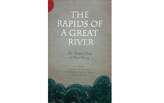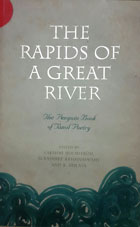BEYOND SANGAM, AKAM AND PURAM – PART I

 An excerpt from the Introduction to Rapids of a Great River: The Penguin Book of Tamil Poetry.
An excerpt from the Introduction to Rapids of a Great River: The Penguin Book of Tamil Poetry.
Edited by Lakshmi Holmström, Subashree Krishnaswamy and K. Srilata.
Tamil poets today have broken free of traditional and prescribed forms of prosody, and conventional ‘poetic’ language and diction; they speak with new voices and address a wide audience in the modern political and social world. Yet poetic categories of akam and puram, landscape associations and bhakti traditions continue to underlie or inform their work in various ways.
Visionary and nationalist, the multi-talented Bharati (1882–1921) moved with felicitous ease between the classical and folk traditions, and was among the first modern Tamil poets to reach out to a wide-ranging audience. With his passionately stated nationalist ideals, his engagement with the metaphysical and the mystical, his belief in the equality of people irrespective of their caste and gender, his Whitmanesque flamboyance, Bharati’s poetry appealed to the old and the young. He died relatively young, but has left a sizeable legacy.
Bharati experimented with a range of traditional and folksong forms. His songs about Indian freedom from colonial rule, about gender and caste equality, and the dignity of the peasant were sung throughout Tamil Nadu in the 1930s and 1940s, inspiring generations of young Tamils. On the other hand, there were his devotional songs, deeply moving in their simplicity. They are loved and sung to this day. His Kannan paattu (Krishna songs) from which we have included two songs in this anthology were influenced by the Vaisnava Alvar of the eighth century. They follow the bhakti tradition in humanising the divine, and underscore the relationship between the poet-seeker and the divine. In ‘Nanda Lala’, which like so many of Bharati’s songs has been set to music, the poet describes in an exquisite metaphor the ecstasy and pain of being in love with the divine.
The turn of the twentieth century was a time when Western influences impacted on many local genres and forms of writing in India; the novel and short story forms, for example, developed all over the country. Bharati, an avid reader, read the English Romantic poets as well as the American and English Modernists. Whitman, in particular, made a great impression on him. He was also deeply influenced by Tagore. Although he was steeped in traditional Tamil poetry and its conventions, and well versed in the ancient grammatical tradition of Tamil, Bharati found free verse liberating, breaking, as it did, the sometimes confining shackles of tight metre.
Courageous and open to experiment, he was the first among Tamil poets to write prose poems, vasana kavithaigal. His Wind poems, where he built on and opened up the codified system of metrics and prosody in which he had been trained, are among the finest examples of his prose poems. For this anthology, we have chosen ‘Wind 9’1, which is remarkable for the colloquiality of its diction and its layered themes and associations.
It begins with a familiar, gentle, scolding tone in which it addresses the wind directly, speaking to it much as though it were a naughty, annoying friend. ‘Look what you did,’ he admonishes, ‘you threw [the books] down.’ But the poem is more than that. Bharati moves on to an admonishment of his countrymen in changing times, and ends with a prayer in praise of the wind god who is more than an ordinary friend.
After Bharati’s brilliant experiments, Tamil poetry had to wait until the 1940s for another breakthrough in poetic diction and registers. An anthology of poems, Pudukuralgal (New voices), edited by Si.Su. Chellappa and published in 1963 was a landmark publication, tracing the development of modern Tamil poetry after Bharati. Apart from the poems of Pichamurti and Ku.Pa. Rajagopalan, who had already made a name for themselves in the 1940s and 1950s, most of the sixty-three poems in this anthology had appeared in the magazine Ezhuttu (Writing) that Chellappa himself edited from 1959. These poems represent a new wave and a self-conscious modernity in Tamil poetry.
Chellappa’s introduction to Pudukuralgal (1963) is something of a manifesto of the new poets. Chellappa not only links the new poetry directly to the experimentation of Bharati, but he also points to the influence of the early-twentieth century Imagists, Ezra Pound and others, and the French experimentation in free verse. He also refers to the influence of more recent avant-garde movements such as surrealism and new modes of visualisation suggested by abstract art. He makes a strong argument for the free verse employed by the new poets, defending their use of line lengths which depend on speech rhythms and the flow of thought rather than the rules of metre and sound patterns which grow out of the cadences of speech. He points to the new material which these poets used; both their interest in subjectivity and psychological truths and their understanding of the changing world about them, where new forms of knowledge brought new perspectives of space and time.
The Ezhuttu poets, as they became known, were widely read for their vivid, intense and unusual imagery and their outspokenness, which yet remained free of ideological baggage. Their poetry broke free of earlier poetic conventions, but invented new forms which were subtly nuanced and lyrical, and made use of natural silences and pauses. Each of the poets, however, has a voice that is individual. Pudukuralgal included, among others, the work of Sundara Ramaswamy Na. Pichamurti, Si. Mani, T.K. Doraiswamy (Nakulan), S. Vaidheeswaran, and Chellappa himself. Many of these poets were to become the giants of modern Tamil poetry.
The new idiom and image which Chellappa ascribes to the new poets are used with great fluency by Pichamurti, the oldest of them. For instance, in his poem ‘Bayam’ (Fear), the image of the door becomes an extended metaphor, containing several layers of meaning. Ultimately of course, the door stands for the mind itself and its lack of openness: If it is opened,
won’t light, like a cow, graze all over us
leaving us nothing?
Bayam, translated by Lakshmi Holmström, Subashree Krishnaswamy and K. Srilata)
References
- Bharathi – Vasana Kavithai’s Wind – Part 9 (full poem): http://www.lyricaldelights.com/2016/04/16/bharathi-vasana-kavithai-wind-part-9/
Excerpted with permission from Penguin Random House India



